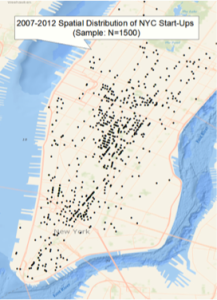The Making of New York City’s Tech Economy
Introduction
The high-tech digital economy has firmly established its position as a key driver of economic growth, one where small start-up tech firms are vital drivers of innovation and regional economic development. Open access to technological knowledge and an increasingly educated labor pool—with expertise in data engineering and communication technologies—have dramatically lowered the entry barriers to the high-tech digital economy. As a result, success-factors of tech start-ups have changed over time. Whereas the success of Silicon Valley was based on the technological edge of highly educated and closely connected engineers and computer scientists, new start-up entrepreneurs in this sector today emphasize the more important role of existing industry ties and the tailor-made application of their new technologies. As a consequence, high-tech development depends increasingly on close links with other industries, to develop and exploit novel and innovative applications. For example, EdTech and FinTech companies are currently at the forefront of this development.
The comparative advantage of metropolitan areas relies increasingly on entrepreneurs founding small-scale digital information and high-tech start-ups, providing essential services and tools for a rapidly changing knowledge based economic development. Not only do the IT and digital industries emerge as a new powerful sector, but also contribute to the development of new networks of innovation—which in turn help to revolutionize established industries. The proposed project, therefore, aims to explain the relationship between entrepreneurial activities and the emergence of high-tech clusters in the New York City metropolitan region.
Studying such phenomenon close to its emergence is of utmost importance, and leads to deeper understanding of the factors that produce successful entrepreneurship and growth in high-tech clusters. At the turn of the new century, relatively few tech start-ups were located in New York City (NYC). Silicon Valley, New England, LA/Orange County, San Diego and even upstate New York far outstripped the New York metropolitan area in tech start-ups. From 2007 to 2011, however, high tech start-ups in NYC grew by 32% during a severe economic recession when other regions experienced sharp declines in venture capital investments. The rate of founding of tech start-ups in NYC more than tripled over the last decade, making the metropolitan area the fastest growing knowledge-based economy in the United States.
The rapid growth of the high-tech economy in NYC cannot be explained by overall economic growth, especially given that the NYC financial industry was the epicenter of the most serious financial crisis since the Great Depression. Why did New York City, particularly Manhattan, experience such explosive growth in high tech start-ups at the outset of a major economic downturn?
Our Approach
Our interdisciplinary approach—including teams of sociologists and economists—focuses analytic attention on institutions in the making of a knowledge-based regional economy. In explaining the rise of regional centers of knowledge-based economic development, our approach explores the institutional drivers of successful entrepreneurial activity. We plan to conduct basic research on knowledge-based economic development near to the timing of emergence, with a focus on the social mechanisms and institutional processes enabling and promoting this new wave of entrepreneurship.

Preliminary research has shown significant evidence of cluster formation in the concentration of tech start-up firms in lower Manhattan. This pattern of cluster formation is consistent with the view that dense networks of like-minded actors and norms of reciprocity are important causal factors in the emergence of trust and cooperation, which we hypothesize enables and guides the emergence of NYC’s tech start-up economy.
Broader Implications
The proposed study is novel because it aims to examine the dynamics of the emergence of spatially concentrated entrepreneurial activity and rapid growth in the founding of tech start-up firms in the New York City metropolitan area.
Project findings will be disseminated through progress reports, and will be provided to all individuals taking part in the study—including NYC entrepreneurs, incubators, accelerators, venture capitalists, angel investors, and local administrative agencies, etc. Additionally, we plan to submit academic publications to the leading peer-reviewed journals and to Harvard University Press.
Project Support
“We are pleased to support research spearheaded by Cornell’s CSES examining the technology sector in cities like New York. In New York City, the growing technology sector continues to diversify and strengthen the City’s economy, creating jobs across a spectrum of related industries and generating critical economic activity and opportunities at all levels throughout the five boroughs. This exciting body of work has the potential to inform policymakers, practitioners, and other stakeholders looking to encourage the growth of tech clusters in cities around the world by suggesting potential strategies and best practices. We look forward to our continued partnership with Professor Nee and CSES, and eagerly await the results of this promising research project.”
-NYC Economic Development Corporation
“NY Tech Meetup is pleased to support the research examining the growth of New York’s technology sector being conducted by Cornell’s CSES. We have been part of the New York technology ecosystem for the past decade, during which time we have witnessed tremendous growth in the tech community as a whole and in our own organization. We believe that research of this type is key to informing and influencing policy and future growth in a way that benefits all of New York’s citizens. We look forward to continuing to work with Cornell and Professor Nee on this project.”
-NY Tech Meetup
“We, at ERA, think the project being conducted by Cornell’s Center for the Study of Economy and Society would be helpful for NYC and we look forward to the research findings and how these findings can be leveraged to improve NY’s start-up ecosystem further by attracting capital, human and technical resources in to the city.”
-Entrepreneurs Roundtable Accelerator
“We are delighted to see CSES’s commitment to understanding the organic development of the technology industry in New York. We believe this market is in an extraordinary period of creativity and collegiality. We are fortunate to have been a part of this community from the beginning and proud to be associated with so many great entrepreneurs, innovators, co-investors management teams, and now academic researchers.”
-RRE Ventures
“We think this project has the potential to provide a lot of insight into the growth and success of the NY tech community. We are really excited to see the data and hear the conclusions the team at the Center for the Study of Economy and Society draws from it.”
-Gotham Ventures
“General Assembly’s history is deeply intertwined with other New York city startups, the city of New York and the growing needs of a knowledge-based economy. Our mission to build a community of individuals empowered to pursue the work they love has been fueled in part by the growth of the NYC tech ecosystem. This research has the potential to inform the future growth of NYC and other major economic centers. We’re delighted to participate and see the conclusions that the CSES team draws from their work.”
-General Assembly

